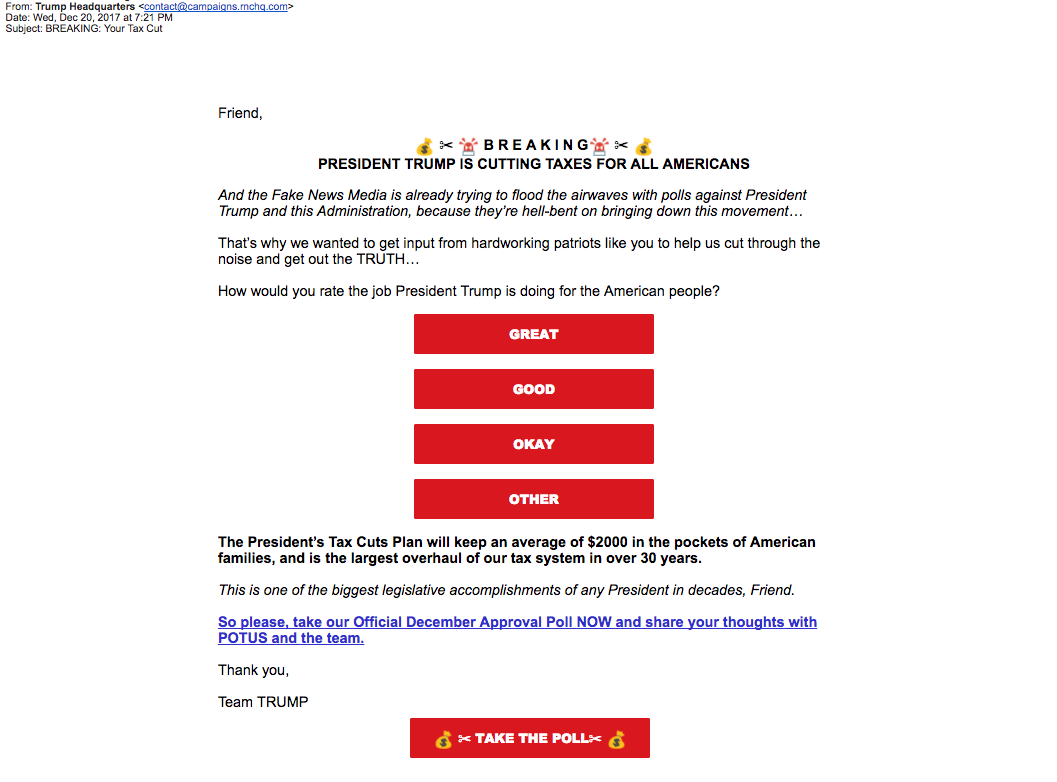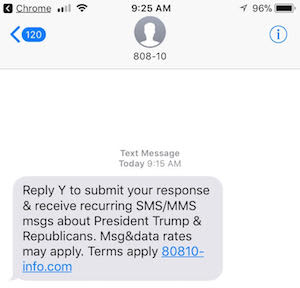The Republican National Committee sent a “push” poll. Here’s why that’s a problem.
A friend of mine got an email “poll” announcement from the Republican National Committee. This is a “push” poll — an attempt to conduct politics using the poll as a cover. I’ll explain why no legitimate political party should ever do this.
Here’s what the email looked like:

And if you scroll all the way down, you see this:

After I submitted a result, this text message appeared:

When is a poll not a poll?
The Republican National Committee has every right to send emails to its supporters, as does any other political party. Putting aside the silly emojis at the top, which don’t belong in serious communications, this email does some things that shouldn’t be included in the activities of a legitimate political party. In particular:
- While a party has the right to object to a particular news article and, conceivably, to a publication, I don’t think parties should be undermining the idea of news in general. By using the general term “Fake News Media,” this email implies that you can’t trust any media, and that’s dangerous in a free democracy.
- The “poll” is not a poll. Pollsters and survey creators know that you must carefully balance questions to eliminate bias. With three positive answers and no negative ones, this so-called poll is designed to be biased.
- No matter what you click on (any of the answers, “Take the Poll,” or the underlined blue link), you get to the poll page. You’re not actually voting until you get there.
- Once you vote, you get pestered for a donation and they start to send you text messages.
- I have seen no evidence that the RNC ever publishes the results of this survey or any others that it collects. All the poll results published on its page are from legitimate pollsters, such as Washington-Post ABC News.
The American Association on Public Opinion Research, describes this sort of activity as a “push” poll. Here’s what they say about push polls:
AAPOR Statements on “Push” Polls
The problem of so-called “push polls”
When advocacy calls are made under the guise of research
This statement from AAPOR explains how to tell the difference between fraudulent political polls—commonly referred to as “push polls”—and legitimate polling, including message testing. AAPOR condemns political telemarketing under the guise of research and is committed to providing information that explains what this unethical campaign practice is and what you can do about it.
A “Push Poll” is Not a Legitimate Poll
A so-called “push poll” is an insidious form of negative campaigning, disguised as a political poll. “Push polls” are not surveys at all, but rather unethical political telemarketing — telephone calls disguised as research that aim to persuade large numbers of voters and affect election outcomes, rather than measure opinions. This misuse of the survey method exploits the trust people have in research organizations and violates the AAPOR Code of Professional Ethics and Practices. . . .
The Threats of Fraudulent Political Calls (Political Telemarketing Under the Guise of Research)
Political advocacy calls made under the guise of a survey abuse the public’s trust. They gain the attention of respondents under false pretenses by taking advantage of the good will people have toward legitimate research.
When disguised as research, these calls create negative images of legitimate surveys, especially when they distort issues or candidate characteristics in order to influence opinion.
They go beyond the ethical boundaries of political polling by bombarding voters with distorted or even false statements in an effort to manufacture negative attitudes.
The hostility created in this way affects legitimate surveys by reducing the public’s willingness to cooperate with future survey requests. . . .
The AAPOR Code identifies fraudulent political polling as unethical conduct. The Code states: “We will not misrepresent our research or conduct other activities (such as sales, fundraising, or political campaigning) under the guise of conducting research” [section I.A.2, emphasis added].
Language matters. Terms have meaning. We undermine them at our own risk.
You might wonder why, with all the outrageous activities of political parties and candidates of all types, I would concentrate on something as minor as this little marketing email from the GOP.
The terms “media” and “poll” have meaning, and that meaning includes at least an effort to be unbiased and deliver actual truth and research. All of us who conduct research start with those ideals. While we have opinions, we try not to let those opinions color the research we do.
When you call this email a poll, you are undermining trust in that research. I would feel the same way if the email were from the Democratic or Libertarian or parties. I can’t stop people from calling this a poll, but those people should not include representatives of a legitimate political party. Every email the Republicans or Democrats send out represents who they are, this one included, and this one says, “You can’t trust media and polls are fake.”
I’d love to hear your opinion on this. If you are a Republican, do you agree that this is wrong? If you are a Democrat, would you have a similar objection if a sham poll like this came out from the Democratic National Committee?
I invite your comments, but to be clear, I will delete comments about that object to the political positions of Trump and Republicans, or “whataboutism” that attempts to justify this activity because of Hillary Clinton’s emails or something else off-topic. This is about words, truth, and research. I look forward to your perspective.
Part of an overall trend I’ve noticed of emails (from many groups, various leanings) saying, “Don’t trust anything–except what we spoon-feed you.” I feel capable in winnowing out the logical flaws and red flags. I see my kids struggling to deal with the emotions these messages engender, in addition to the roller-coaster of their hormone-soaked (and experience-poor) teen world. And I see my 92-year old parent accepting the spoon feeding, because why would it be printed if it wasn’t true.
It’s a dangerous world out there.
I somehow ended up on the GOP’s mailing list and get emails like this on a regular basis. Where my bullshit detector goes off is in the array of choices about the president’s performance—it stops at neutral (Other) and doesn’t offer a negative option unless you add in your own. So I share these on social media on a regular basis and tell my friends that they should comment about how they really feel. Apparently that hasn’t had enough of an effect and the Republican party continues to send these out…
I read this and wondered why the author would only point out the manner in which this “process” is done through the GOP. This activity is commonplace in DNC “pushes” too. I think if this media strives to be objective, its authors’ messages ought to have that bent as well. It almost smacks of political bias – and there is much of it these days – against anything capital or small ‘C’ conservative. I am not a conservative, but neither am I sanctimoniously liberal – that appears to be the purview of many others who produce such articles.
The author invites you to apply the language in the RNC’s email to a case in which the DNC or any other organization includes the same approach. Marc, all you did is simply state your opinion that the author is biased. Either you didn’t read the the article, or your reply is just an off-topic complaint. And you don’t even address the topic of the article: Are such emails real polls or not? I say no matter what org sent the email, the answer is “no”.
Your “sanctimonious liberal” charge shows your true colors: You’re an ardent conservative, Trump booster, or both. You’ve added zero substance to the debate.
Let’s leave the name-calling out of this, ok?
If the DNC is doing this, show me an example. “They do it too” is not a justification.
I get almost constant e-mails from both the republican party AND the democrats. I often get these “polls” from the republicans or someone directly representing Trump. I scanned through 2 months of e-mails from various democrats, and have yet to find a “poll” like this from them. Biased reporting, but not biased “polling”.
Politically I usually am somewhere between conservative and libertarian, and wrote in a name for the last presidential election because I found too many of Trump’s and Clinton’s positions on many issues unacceptable. I mostly agree with what you wrote in this article. Party-affiliated (and most non-party affiliated) organizations sending out such things are really just seeking money. That applies to organizations from all points on the political spectrum. They employ whatever means brings in the donations. It helps to stir up the emotions before the “ask.” Those polls are currently an effective method. As people become immune to them, other means will be used. As to the expression “Fake News Media”, it is a fund-raising term that has a specific meaning for some on the political right. It is not taken to mean all media – only those that don’t support “their position.” It’s a term that, like all such fund-raising calls to action, has some basis in reality, but has been hyperbolized in a way that is intended to tamp down thought and stir up emotions. The political left has their own. That is not “whataboutism”, which is a morally empty argument using one wrong to justify another. My point is that the expression “fake news media” is one of a long succession of “battle cries” used to raise money. It won’t be the last. It’s easy to spot those from the “other side” of the political spectrum. The bigger challenge is to recognize those emanating from one’s own side. The more independent we can be in our thinking, the easier this is to do. The first step is to understand that those in power have, as their number one objective, to stay in power. The best clue to a fundraising “battle cry” is when something (usually something simplistic) pulls at one’s emotions – that means it’s time to stop and think.